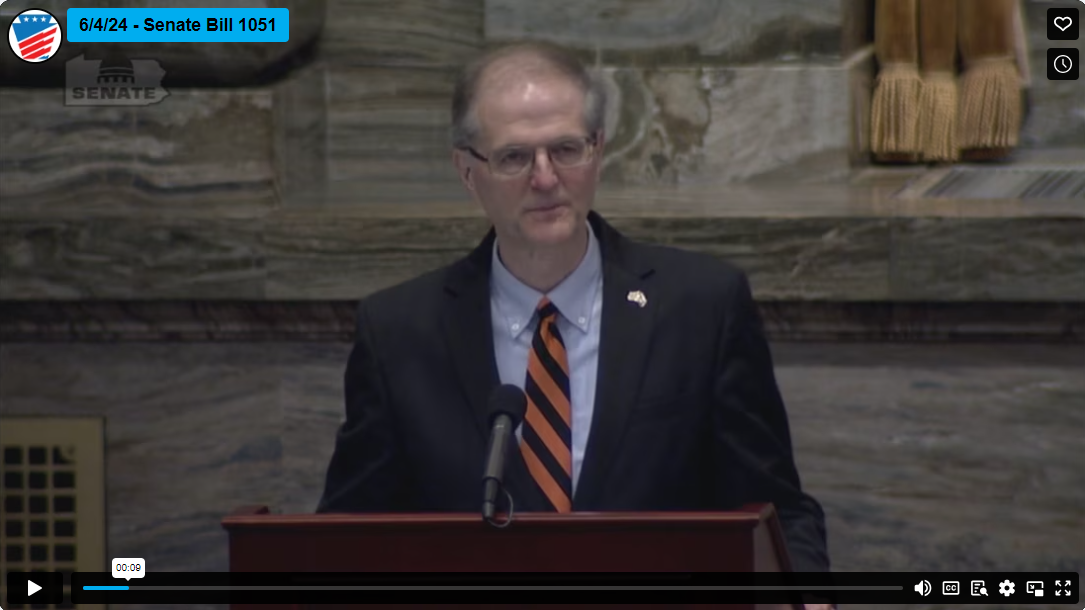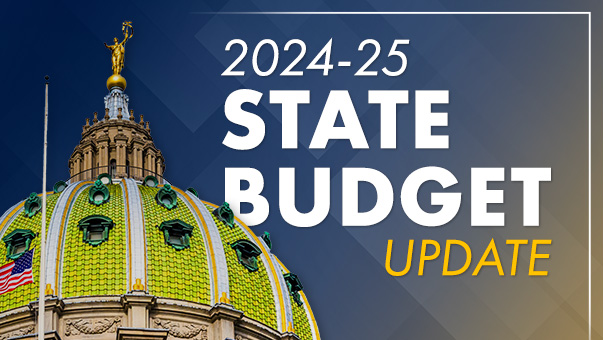
|
||||
|
In this Update:
Senate Approves Bill to Reform PA’s Tax Appeal ProcessThe Senate this past week approved Senate Bill 1051, legislation I introduced to streamline and improve the process of resolving tax disputes with the Pennsylvania Department of Revenue (DOR). My colleagues and I have found that, sometimes, our state tax collection agency can get a little overzealous when interpreting applicable tax law. My bill gives taxpayers a little more time and some options when responding to assessments by the DOR, while also benefitting our Commonwealth by resolving tax issues sooner and allowing tax liabilities to be collected more quickly. Pure and simple, this bill is a taxpayer protection proposal that makes a complicated system clearer, simpler and taxpayer-friendly – it’s a win-win for all parties. Currently, taxpayers who disagree with a final decision made by DOR have a 60-day deadline to appeal the decision to the Board of Finance and Revenue (BF&R). That often leads to cases being dismissed on a technicality rather than being decided on its merits. BF&R receives approximately 4,200 appeals annually. The board must resolve each appeal within six months of filing; otherwise, the underlying DOR decision is upheld. Currently, only about 13% of eligible appeals are resolved through settlement prior to an appeal before the Commonwealth Court. Additionally, current law does provide BF&R with the authority to direct a settlement process. SB 1051 will allow BF&R to accept late-filed applications if good cause is shown by the taxpayer and the reason permitting the late-filed appeal is agreed to by any other party. The bill would also empower BF&R to create a formal settlement process, which will allow more tax disputes to be resolved without a final board decision – thus reducing litigation costs for taxpayers. The Pennsylvania Department of Treasury, with which I worked to develop SB 1051, estimates that up to 500 cases annually could be settled under this process, benefitting many individuals and small businesses who don’t have the resources, time or money to navigate the current bureaucratic, cumbersome and inflexible tax appeal process. My commonsense, pro-taxpayer legislation now heads to the state House of Representatives for consideration. New Distracted Driving Law Bans Use of Handheld Devices
A new law prohibits the use of handheld cellular and other devices while operating a vehicle on a Pennsylvania highway or traffic way. Drivers may still use their phone if they are using hands-free technology, such as a docking station, Bluetooth or speaker technology. For the first year, only warnings will be issued for violations. After that, there will be a $50 fine. Distracted driving fatalities in Pennsylvania surged to a decade high in 2022, claiming 80 lives. The AAA Traffic Safety Culture Index found that the majority of drivers believe distracted driving has outpaced all other traffic-related issues as a growing safety concern. All of Pennsylvania’s border states and 28 others have enacted hands-free laws. Respecting Taxpayers Remains a Top Priority in State Budget Negotiations
In Pennsylvania, the state budget is to be completed by June 30 of each year. As we work to reach consensus, Senate Republicans are continuing to fight for a budget that respects taxpayers and makes the best use of the state’s resources. In February, Gov. Josh Shapiro proposed a massive $3.2 billion increase in state spending. Last month, Senate Republicans unveiled an alternative approach that would reduce taxes by approximately $3 billion annually. Instead of growing government bureaucracy and picking winners and losers, our plan would allow Pennsylvanians to decide how their money should be spent. These historic tax cuts would provide relief to every Pennsylvanian who earns a paycheck by reducing the personal income tax rate from 3.07% to 2.8%, and every person paying an electric bill by eliminating the Gross Receipts Tax on energy. Learn more about the process of enacting the 2024-25 state budget and watch the Senate in session here. Senate Approves Bills to Reverse Nursing Home Worker Shortage
With the number of older Pennsylvanians rising and nursing homes struggling to find qualified workers, the Senate passed two bills this week to reverse the worker shortage. Both bills now head to the House of Representatives for consideration. Senate Bill 1102 would increase the number of nursing home workers by streamlining the training and certification process and removing barriers that prevent people from entering the health care workforce in Pennsylvania. Senate Bill 1104 would further increase the nursing home workforce by enabling high school juniors and seniors to earn up to two elective credits for working or volunteering at a nursing home, personal care home or assisted living facility. Schools would establish program guidelines and procedures to allow students to earn one elective credit for each 250 hours of paid or volunteer work at a qualifying facility. Legislation Giving Disabled Veterans Financial Relief Receives Senate Support
To provide financial relief to more disabled veterans, the Senate passed Senate Bill 194 to exclude U.S. Department of Veterans Affairs and Attendance benefits as income when calculating eligibility for Pennsylvania’s 100% Disabled Veterans’ Property Tax Exemption. Federal Aid and Attendance benefits provide monthly payments to disabled veterans who are housebound or need help with daily activities. Without the exclusion of this federal benefit, some disabled veterans are prevented from qualifying for property tax reductions. The bill now moves to the House of Representatives for consideration. Senate Acts to Modernize Rules for Electronic Commerce
The Senate passed legislation to modernize the Uniform Commercial Code (UCC), updating rules that govern digital asset transactions to ensure security, consistency and confidence. It now advances to the House of Representatives for consideration. The UCC has provided consistency for commercial law and interstate commerce since 1954, when Pennsylvania led the initiative to adopt it. Since then, it has been adopted by all states and gives Americans legal confidence when transacting business across state lines. The last major revisions to the UCC took effect in 2001. In the two decades since, electronic property, or digital assets, have become much more prevalent in commercial transactions. Senate Bill 1084 would bring the law into the 21st century by establishing guidelines to cover digital asset transactions involving virtual currencies, non-fungible tokens, electronic accounts and other forms of electronic commerce. It would also make other needed technical updates to the UCC. Celebrating the Contributions of PA Dairy Farmers
Agriculture is Pennsylvania’s top industry, and dairy products play a significant role by generating $11.8 billion in economic revenue and supporting 47,000 jobs statewide. Of the nearly 5,000 dairy farms in the state, 99% are family-owned with many being handed down generation after generation. Our dairy farmers work tirelessly each day to provide families everywhere with nutrient-rich foods. Dairy products contain nine essential nutrients that help to manage weight and reduce the risk of high blood pressure, osteoporosis and certain cancers. The nutrient powerhouse also helps build and repair muscle tissue and maintain healthy skin. Celebrate National Dairy Month by raising a glass of milk or enjoying some delicious ice cream. Pennsylvania has an Ice Cream Trail that boasts great creameries all across the state.
For anyone who hasn’t already signed up to receive my e-newsletters, you can get on the mailing list here. |
||||
|
||||



Want to change how you receive these emails? 2025 © Senate of Pennsylvania | https://www.senatorscotthutchinson.com | Privacy Policy |







